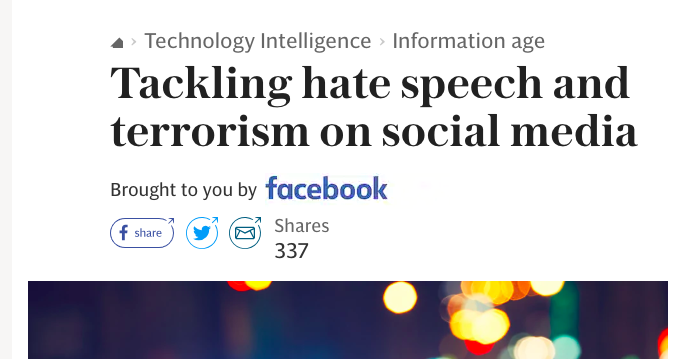Facebook paying UK newspaper the Telegraph to publish glowing coverage amid scandals – report

Facing an onslaught of negative headlines and critical press coverage, Facebook has begun paying UK paper the Daily Telegraph to run admiring stories about the “positive impact” the social media giant can have on people’s lives.
The partnership has seen the Telegraph run 26 stories defending Facebook over the last month, dismissing “technofears” about the company, while dealing with issues of key importance, including terrorist content, online safety and cyberbullying, Business Insider reported.
The Daily Telegraph has published dozens of stories "brought to you by Facebook" over the last month — putting a positive spin on crises facing Facebook including hate speech, terrorism, cyberbullying, and child screen-time. https://t.co/7GeYwlnPZupic.twitter.com/EpMNfVqf5n
— Rob Price (@robaeprice) April 3, 2019
The series is called “Being human in the information age” and is overseen by Telegraph Spark, the paper’s sponsored content unit. The stories are labeled “Brought to you by Facebook” but, aside from that, they are indistinguishable from a regular news story.
Newspapers publishing sponsored content is not totally unusual and is an “increasingly popular method of monetization” for many publications, Business Insider writes – but at a time when lack of public trust and concerns over “fake news” are plaguing Facebook, paying newspapers to spread positive content about it might backfire.
Also on rt.com Facebook plans to curate ‘high quality’ news for its users from ‘trusted outlets’Ironically, the news about Facebook’s partnership with the Telegraph also comes just days after CEO Mark Zuckerberg told German publishing house Axel Springer that the platform was considering paying publishers to use their content in a dedicated news section in order to reward “high-quality, trustworthy”journalism.
On Monday I wrote about @Facebook's sure-to-fail plans to hire human editors to curate the news & to pay newspapers and reward "trustworthy" content. Looks like part of the new collaboration with publishers involves Facebook paying papers to run positive content about...Facebook. https://t.co/TIcC0NfF7c
— Danielle Ryan 💬 (@DanielleRyanJ) April 3, 2019
Despite its best efforts to secure some glowing media coverage, it’s been another bad PR week for Facebook, as it was also shockingly caught asking new users for their email passwords during the sign-up process. The tech giant later admitted that demanding people’s email passwords wasn’t “the best way” to have people sign up, and said they would stop “offering” that option. The password scandal came just two weeks after it was revealed that Facebook stored passwords for hundreds of millions of its own users in unencrypted plaintext for seven years. Oops!
Some cognitive dissonance between the Telegraph's Facebook sponcon page and its actual tech homepage pic.twitter.com/6zdIjlsXLn
— Ryan Mac (@RMac18) April 3, 2019
As part of the new campaign, the Telegraph ran a piece about Facebook’s work to “ensure terrorist content is identified and removed as swiftly as possible” – but just two days later, a gunman killed 50 people at a Mosque in New Zealand and live-streamed the gruesome event on Facebook.

Another piece, written by geneticist Adam Rutherford, examined the “technofears” that have dominated history and dismissed skepticism toward technology, even downplaying negative effects of too much screen-time for kids. It may “feel” like kids being “glued to their phones” causes harm, but there is “very little evidence to suggest that screen-time is a significant factor in real social and personal issues, including wellbeing, depression and violence,” Rutherford wrote.

Other pieces focus on Facebook’s charity work, online behavior classes for children, artificial intelligence, and combating online scammers. It is not known exactly how much Facebook is paying the Telegraph for the articles or if the company has editorial control over the final product.
Vicky Gomes, a spokesperson for Facebook, said the sponsored content in the Telegraph was part of its broader “marketing efforts” in the UK with the goal of “driving awareness” of the “positive impact” the social media giant can have on people’s lives.
Also on rt.com Want a new Facebook account? Just hand over your private email passwordGomes said the Telegraph will also run “profiles of London-based employees” who are working on the “toughest issues,” as well as articles to “educate people” on topics like “how to adjust their privacy settings” and, somewhat ironically, “how to spot fake news.”
It’s not the first time Facebook has paid British newspapers for content but, in the past, the method has been used for “far less politically charged” topics like how to grow a business with video content, and how to understand your customers, which were published in the Guardian in 2016 and 2017.
Like this story? Share it with a friend!















